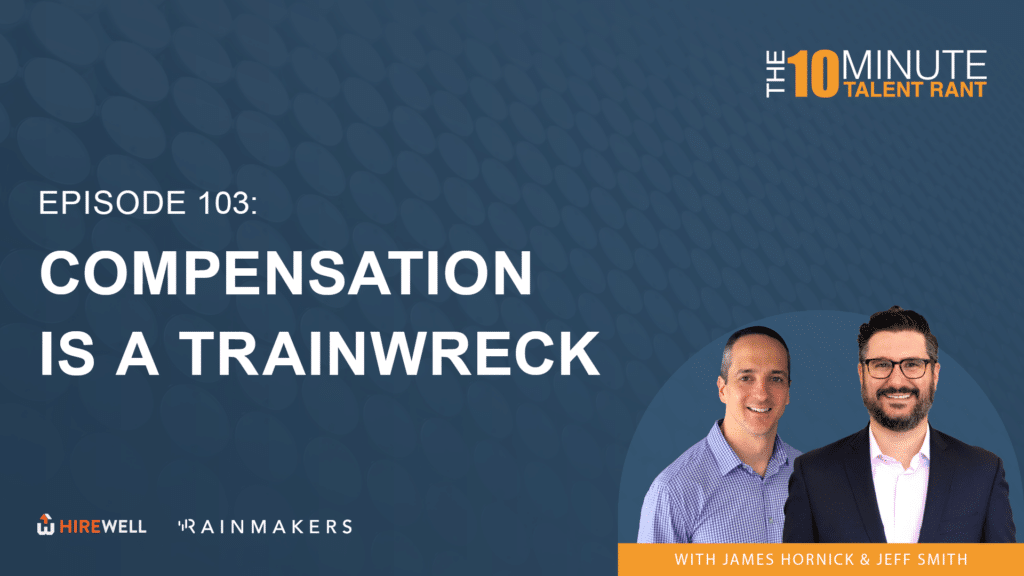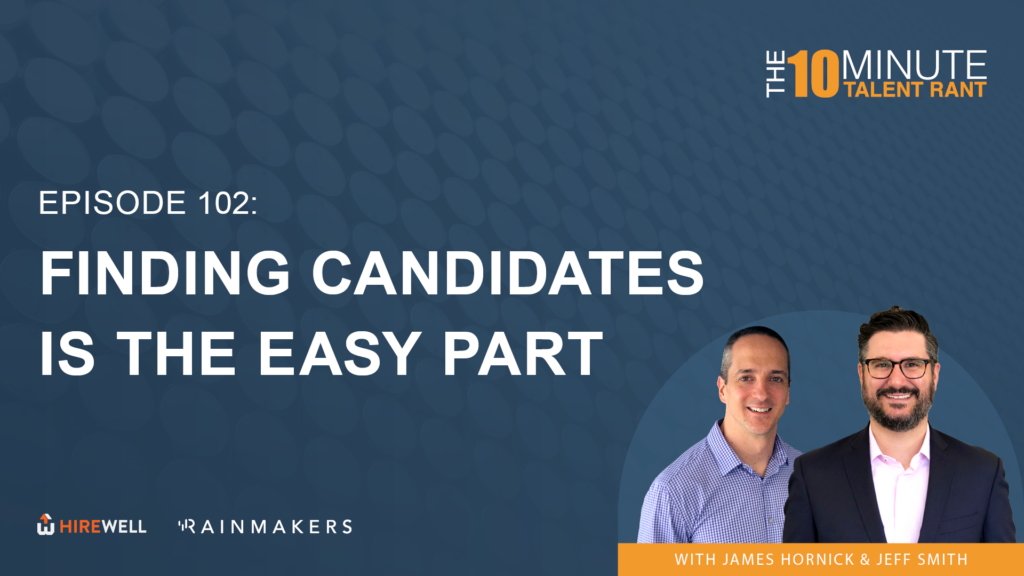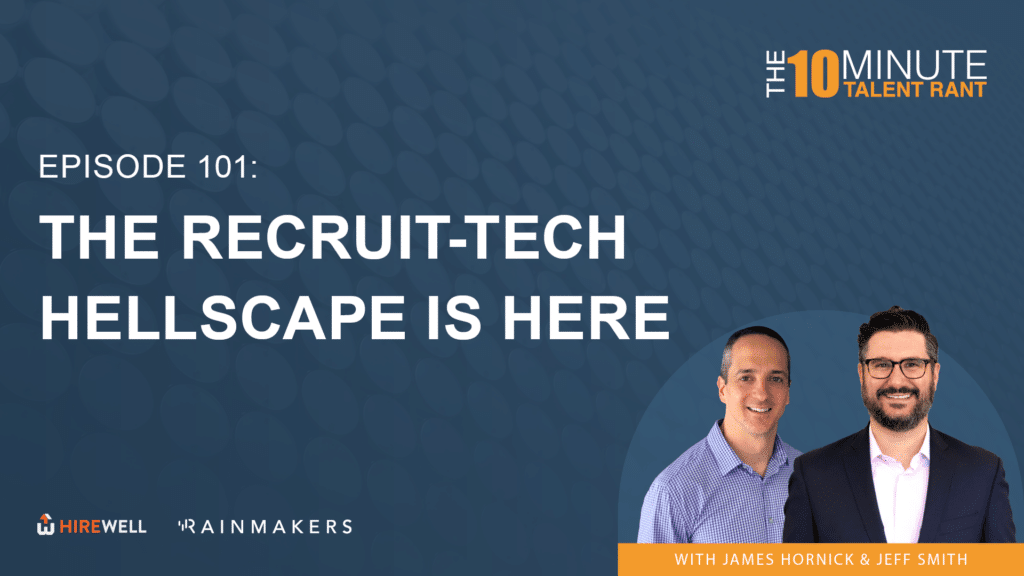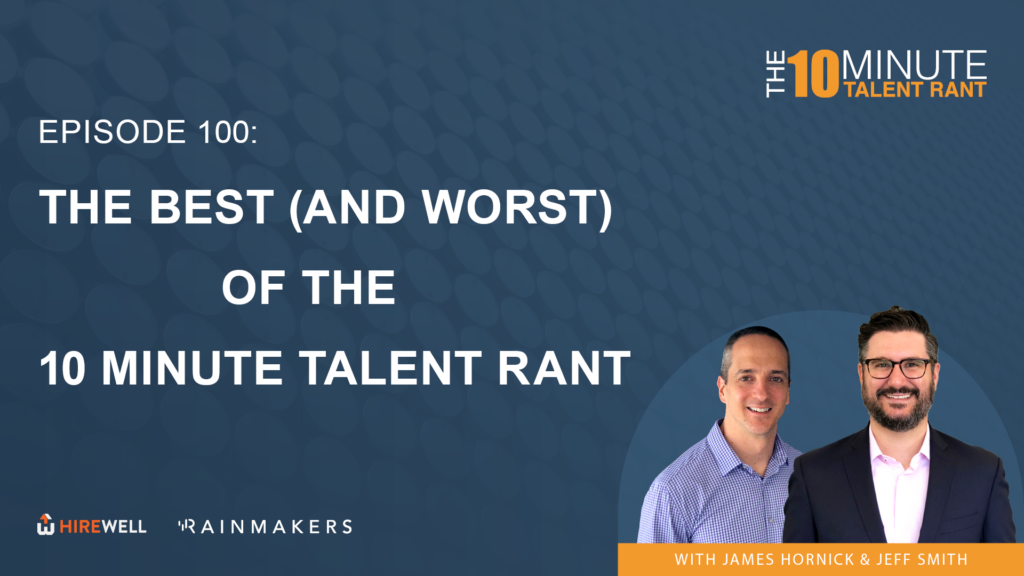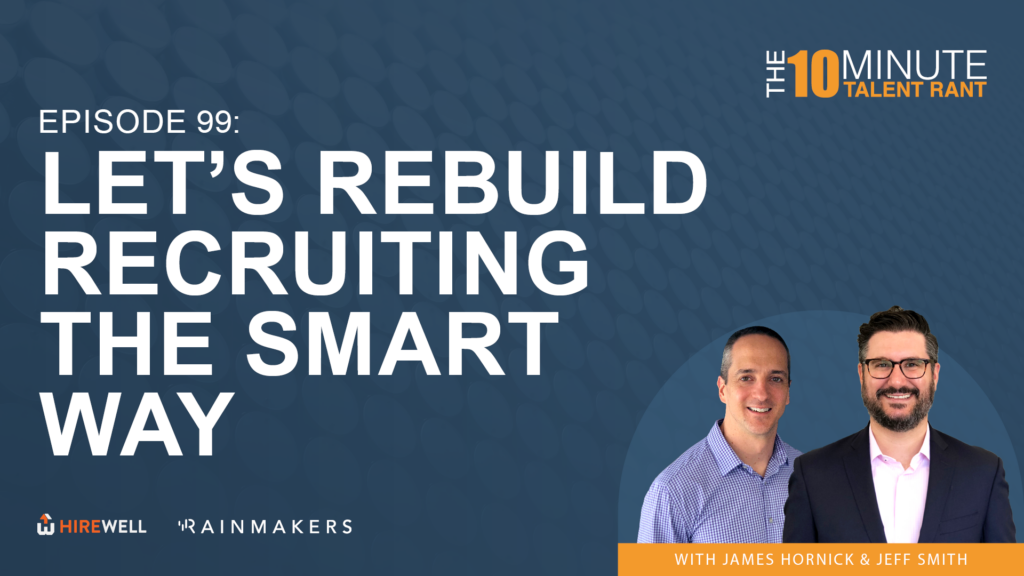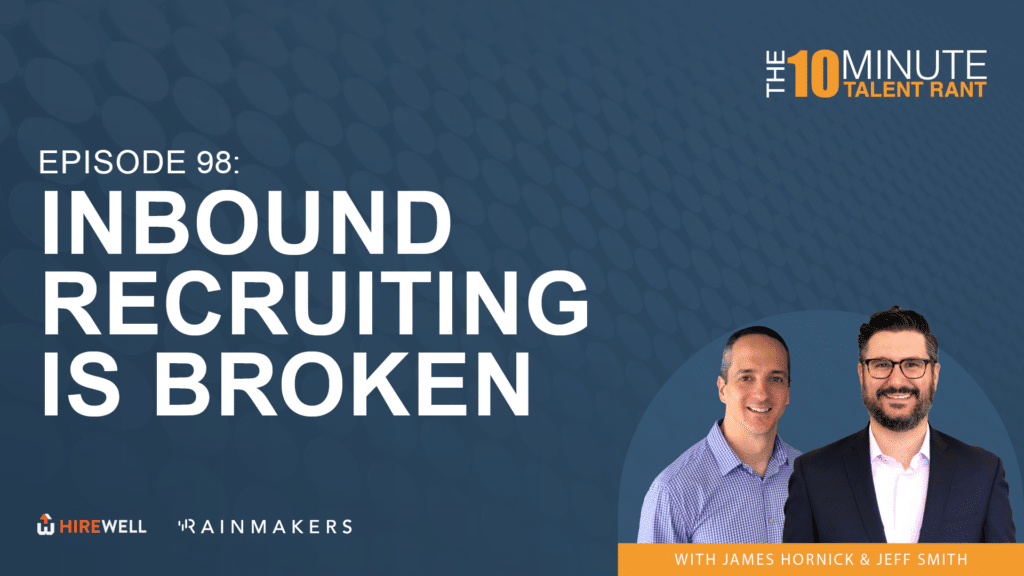The 10 Minute Talent Rant is live. I’m James Hornick joined by Jeff Smith and we are on the clock. The 10 Minute Talent Rant is our ongoing series where we break down things that are broken in the talent acquisition and hiring space. Maybe even pitch a solution or two. I think we got some this week. Before we dig in, all of our content can be found on talentinsights.hirewell.com.
This week’s topic: lame recruiting takes that need to die. Not as flame throwy but tangentially flame/ throwy. Kinda, yeah. Do you ever feel like the recruiting, we’re just kind of stuck in neutral- the recruiting industry. Like years go by. We have the same issues over and over again. And I guess like, is that true or is it we just talk about the same stuff like it’s Groundhog day.
And when I say we, I mean collectively the we- you know, recruiters and talent acquisition, even job seekers and career coaches on social media and everywhere else. It’s the same talking points brought up again and again. And you see someone post it, then you start giving your take and it just kind of becomes this big recycling thing.
Here’s my hot take on hot takes, we need to get past the really the things that are non-issues or the things that have already been solved that people haven’t realized that keeps us from talking about like the real stuff that propels the industry forward. Yeah. You get stuck talking about recruiting specific stuff as a recruiter
but I do think that LinkedIn is inundated with specific recruiting bad takes. Our good friend, Erin Riska, sent a comment over when you put your post out for the promo and the whole idea of the hiring- hiring is broken take. Like we get it. It’s the dumbest of all dumb takes. It’s not actually saying anything.
You’re just yelling into the cloud once again, anyways. So we compiled this list, right? No particular order. So we don’t take more egregious offense to one over the other, but we just kind of wanted to walk through these. So you want to get us started on number one? Yeah, let’s get it started. And there’s a couple of these where I think it’s fair to keep making more takes with a couple of parameters, a few specifics.
But first one, the great resignation. I was so over this, like a year ago. It’s the most overused word. It’s the laziest take to start talking about. Anybody who’s wanting to make a job change in the last 18 months has already. Plus, I think this whole- like unless you’ve been living under a rock for the last two, three months, it’s kind of over. Like layoffs have started.
The market is starting. Everything’s kind of normalized a bit. It’s just been beaten to death more than any issue I can remember. And newsflash! Companies that are losing people, they know they’re losing people. They don’t need you to remind them. They know. It’s their company that people are- like it’s not like you’re doing them a favor by talking this stuff over and over again.
Anyways, I digress. Moving on. And they’re probably okay with it. At this point, if they haven’t changed their business model around it, and they’re still producing revenue, like they don’t really care, so. Hey, how about those firm handshakes? Like we get one-on-one. Yeah. Like social norms are you want to be familiar with them.
Like it’s good. We don’t have to, riviting stuff. Yeah, exactly. How to get past the ATS? As if the ATS is this AI, juggernaut- this super computer that’s bucketing and decide- newsflash, HR technology, a topic we’ve already touched on, is the most archaic dumb technology in all of technology.
It’s basically an Excel sheet. Literally, it’s an Excel sheet that just looks better. How dumb do you sound, if you say you can’t get past the Excel sheet because that’s ultimately what’s really happening. Yeah. And so in seriousness, this is something that needs to be said I think. There is this notion that like candidates can’t get past this amazing gatekeeper.
And it literally is not doing that. It’s just, it’s a volume thing with less recruiters. Like there’s just not enough people getting through this stuff. The next one, the green LinkedIn open to work banner. This just keeps coming back. We’re talking about data before, so there’s actual data on this. There’s no discussion to be had based upon this data. Just published, “How to improve your InMail response rates”
according to LinkedIn data author by Greg Lewis, content marketing manager of LinkedIn. This was published May 22nd, I believe. So it’s fresh. It’s like a week or two old. Messages sent to banner candidates, get a 35% higher response rate period. That’s it? Recruiters use it because job seekers respond to it.
There’s literally nothing else to discuss here. Yeah. Anyways. I want to talk to candidates who are going to be more engaged. The banner helps me do that. The next topic, the value and non-value of degrees and certifications. So here’s the thing. It’s not that this topic is bunk. I think it’s actually an important topic, but the hot takes we consistently see with zero data actually backing them up
is what we need to kind of put and end to. It’s not impossible to start backing these with like, instead of just like spouting off an opinion, but actually like backing these things with hiring numbers, job numbers per skill set, the salaries people are getting with or without a degree or with or without a certification.
It makes it pretty clear cut where they are. Now it’s time consuming. I didn’t spend, I didn’t look at dozens of skillsets and salary ranges and who has degrees for this 10 Minute Rant we went on. But I can say that for an example, right now we are currently placing software engineers with no degrees
at market rates. That’s a fact. Fact. So you can extrapolate from there and talk about, have further discussions but like talking about the stuff without doing any research before you further this point along, it’s a complete waste of time. It’s just baseless opinions. But it would be good if we can start just adding data to those opinions, we can make them a little more intelligent and thoughtful.
Yeah. Conversely, at the entry level for business centric roles, like sure. Then you can start talking about the value of a degree- you’re going to see that in the data anyway. Okay. The value, the utility of cover letters, thank you letters or literally any damn letter whatsoever. Like the notes they yawn.
I’m not going to do the yawn, but it is. It’s a non topic. No one needs any more advice on what to include. I would argue this kind of goes back to the social norm stuff with the handshake. We’re not for or against this stuff. There’s no right or wrong way. It’s common sense that a well-crafted human message for any of these things
is potentially going to be useful. I just, I worry that the talking heads out there, they say like oh, you got to bank on this. Like, it’s going to get you from point A- there’s no silver bullet. Like you don’t know what I’m going to react to or what James is going to react to or what the next recruiter’s going to react to.
Yes, it’s helpful. Is that the end all, be all? It is not. It’s just so basic. So basic, anyways. Next one that comes up, ghosting. Did I ever tell you the story about this. I don’t know if you remember one of the first time I was on the news locally here in Chicago. I remember. It was on ghosting. What’s funny is that Fox Chicago, they interviewed me because their producer or someone was putting the other story because they had heard that there was a big problem with ghosting,
right? So I’m thinking okay, they’re going to talk about- they want to hear about companies ghosting on candidates. No, it was the opposite. Yeah. There was a apparently an epidemic of people who are ghosting on interviews and not showing up, not showing up the jobs. And they were shocked to discover what I was kind of talking with them in the interview, that the problem is just as bad, if not worse, on the opposite side .Companies ghosting on candidates and not responding after interviews.
It’s as if there is, it’s a human condition. It’s an issue where there’s conflict avoidance and people hate giving bad news. And when things make people uncomfortable, they tend to just run away from them instead of addressing them head on. I mean it’s why family, friends, relationships, like literally every single person out there listening to this right now has ghosted someone else in their past and has been ghosted on.
The real issue is maybe let’s have a discussion about like, if you’re in the interview process or you’re interviewing someone, how you can proactively find strategies to make people feel more comfortable being open about giving bad news is the real conversation we need to be having- not stop ghosting and just yell to get get people. Right.
Just a thought. Yup. Yup. Remote work. I mean look, yeah. I’m going to go there. We went there, we’ve run this into the ground. Like, I mean, right in the ground. It’s simple. If you’re hybrid or onsite and you can hire, great. Do it. Yeah. Not even saying you shouldn’t do it. That’s not even saying you shouldn’t have people in the office
if you can hire. The point is, if you can’t hire and you’re looking at this from a hybrid or on-site, you’re literally, literally data limiting yourself to one and a half percent of the total talent pool. We’ve linked it. We’ve talked about it ad nauseum. Small funnels. Data. It’s amazing. Data.
Yeah. Last one. This one was crowdsourced and I’m going to butcher her name, but I’m going to give her credit anyways. So Kelly. I’ve never actually tried to pronounce her name before. I’ve seen a million times, but now I feel like an idiot because I probably said that wrong. Kelly let us know if it’s wrong.
Yeah. Entry-level jobs shouldn’t require two to three years of experience. This is a really dumb topic. I’ll take not understanding job board experience, classifications of conflating them with actual required experience for a thousand Alex. Yes. A bazillion. Here’s how it works. Some of these job boards, they bucket zero to two years, zero to three years experience.
Then they bucket four to six and then they bucket seven to 10. So when companies post things on job boards and they want a two-year person, it will automatically go under the zero to one or zero to two year experience classification. It was never an entry-level job. It just fell in when you filtered by zero to two, it just fell into the same things.
And people conflate that with, they want two years of experience with an entry-level person. I’m not saying it never happens, but I’m 99, I guess I shouldn’t throw out bullshit data- almost all the time. Take a look. You’ll have a really hard time finding things that are actually advertised as entry-level and requiring two years experience, but you will find a lot of things classify that under job boards
if you look at the filters, anyways. Exactly. Fixes. Let’s get into this. Ironically, a lot of these based upon our previous rants, it’s kind of weird. Really weird. But let’s challenge ourselves to address some real problems. Things like, kick us off here Jeff. Better tech, talked about it. We rely on garbage. We, the industry.
There’s a propensity for us, our industry to worry about automation. The point is we want more automation to accentuate the actual human conversations that we are having that is actually valuable. Number two, there should be better processes internally. We should be looking at things from a project perspective and not just yelling across the table about where are my candidates? Why aren’t the funnels filled?
We get caught in these echo chambers and all it really takes is to put on your project manager mind and figure out how to get from point A to point B. Yeah. Better business models, let’s talk about this. Systemic problems are typically caused by structure and recruitment industry has been addicted to the contingent model and other things for ever.
And there’s lots of other models that are emerging here and there. Let’s talk about those. Let’s talk about maybe new ideas people aren’t even trying out yet, but that’s, if you want to make a dent, that’s how you do it. The problem in my mind and especially the mind of job seekers I would have to say, better targeting and better messaging and how to scale it.
How do we target more relevant people? How do we target the right people with the right message at scale? These are the conversations that would do amazing things for the industry. If we’re having these more often, getting really granular with them because that’s how we can really move the needle, push things forward in the eyes of job seekers.
Yep. And finally more inclusivity and yeah, we’re talking about DEI and underrepresented populations, marginalized populations. But I think talking more openly about people who are making career pivots, changes, combating ageism. There’s all sorts of folks out there that can think about a problem in a unique way.
It would behoove us all to put ourselves in a situation where we’re all helping each other out by having open discussions about things. Weird, I know. Yeah. And we are short on clock. Thanks for tuning into the close to 15 Minute Talent Rant, part of the Talent Insights Series. I did not think this will be a long one, anyways.
Always available for replay on talentinsights.hirewell.com well as YouTube, Apple podcast, Google podcast
, Spotify and Amazon. Jeff, thanks again as always. Everyone out, there we’ll see you soon.







